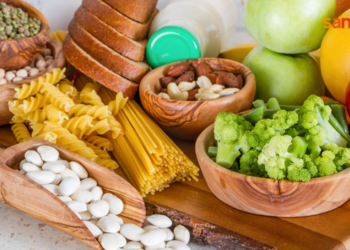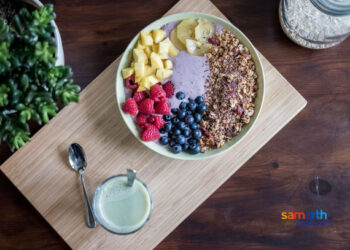Considered to be among the exotic or the English vegetables, Broccoli has become a common sight in the neighbourhood vegetable shops today. Did you know that the Broccoli seeds were brought to India from Kenya around 1990, during the Gulf war by Jitendra Ladkat, belonging to a farming family? His father, who worked in the Royal Indian Air Force, took to cultivation post his retirement in 1945.
Upon suggestion from his English bosses at the time, he started cultivating ‘exotic’ vegetables like Celery, Lettuce, Flat Parsley, etc. on his farm in Pune. Jitendra, his son, went to Israel to study new farming techniques and learned that any vegetable could be grown anywhere. Thus he started with Broccoli, Baby Corn, Artichoke, and more. Today, a lot of the urban population, at least, is familiar with the sight of the ‘green coloured Cauliflower’ and many even understand that it is an exotic and valuable food.
About Broccoli

Join Now >
It is a cruciferous vegetable, much like Kale, Cauliflower and Cabbage; In looks, it is very similar to cauliflower, with green colour florets. However, in texture, the green florets are softer and a bit more flowery than the Cauliflower florets. Also, it cooks faster than Cauliflower and also possesses a lot more health benefits.
It also comes with a strong reputation of being a superfood, which is recommended by most dieticians as a counter to many new age diseases like diabetes and even cancer. The reason for this is that it is low in calories while being high on nutritional benefits. It is a powerhouse of antioxidants that can help us combat a whole range of issues and contains a host of minerals and Vitamins.
The best part about Broccoli is that it can be eaten raw, or cooked; but, as in the case of many other vegetables, the various modes of cooking like boiling, frying, cooking in the oven, steaming, stir-frying, etc. alters the nutrient profiles of the vegetable. The best way to eat Broccoli is said to be steaming it, which retains most of its nutritional value.
Anticancer properties
Research conducted on cruciferous vegetables shows that they have a wide range of antioxidants that help prevent cell damage leading to cancer. Components like Sulforaphane, Lutein, Zeaxanthin and Indole-3-carbinol, present in these, are said to have powerful anti-tumour properties that help in the fight against cancer.
Broccoli also contains anti-inflammatory bioactive compounds like Kaempferol, which helps support the anti-cancer properties. Tumours caused due to inflammation, causing cell damage is one of the most prominent causes of most types of cancer. One study even proved that Broccoli consumption reduced inflammation markers in tobacco smokers. The various types of cancer that can be prevented through Broccoli consumption are breast, prostate, stomach, renal and bladder.
Builds Immunity
Since it is a rich source of Vitamin C, Broccoli helps our body to build immunity against a whole range of diseases and infections. Cardiovascular diseases, cancer, diabetes, cataract, anaemia, etc. are just a few of the diseases that Broccoli can keep at bay.
Diabetic-Friendliness
Broccoli is one of those foods that diabetics can have with ease; some studies have even indicated that the antioxidants present in it can help reduce/manage the blood sugar levels. Besides, Broccoli is also a great source of fibre, which again is known to be good for diabetes management.
Good for Heart
Apart from cancer and diabetes, Broccoli may also help people keep their hearts healthy. Broccoli consumption has been linked to the reduction of bad cholesterol levels while helping improve good cholesterol levels. The fibre, Potassium and the various antioxidants in Broccoli are the reason for it helping cardiovascular functions. These, especially the Potassium helps reduce the high blood pressure, which in turn, leads to heart attacks, and strokes.
Good for Digestion
Another issue that troubles most people as we age is constipation; many people often experience digestive issues as they grow old. The fibre and antioxidants in Broccoli will immensely help with a healthy gut function. Studies have shown that Broccoli brings about favourable changes in the gut bacteria, while the fibre content helps with improved bowel movements.
Helps Bone Health
Vitamin A, C, Calcium, Phosphorous, and Zinc content in Broccoli also make it an aid for improved bone health. Studies have proved that Broccoli consumption can prevent osteoporosis and other bone disorders which are also common in the ageing population. For the same reason, Broccoli is also good for oral health, as it helps prevent dental diseases. There is a reduced risk of periodontitis as well as oral cancers.
Good for Skin
Some of the bioactive compounds in Broccoli also helps protect against skin damage, especially from the UV rays of the sun. Certain studies have shown that Broccoli consumption helped reduce tumour growth and aided skin cancer treatment. It also helps delay the signs of ageing in the skin like wrinkles, since it helps with collagen production, helping the skin remain young and healthy.
Some studies are also indicating that Broccoli can slow down mental decline and even help with improved brain function, through brain tissue recovery. A lot more research is needed in this direction. However, with so much going for it, it does look like Broccoli is indeed a superfood that can provide you with immense health benefits.










